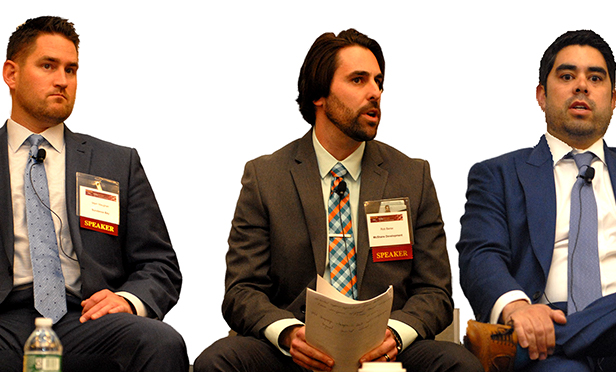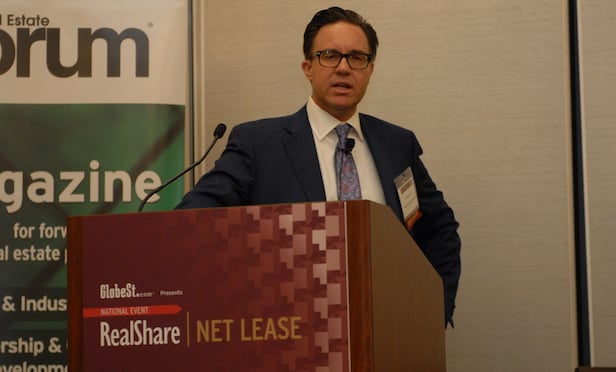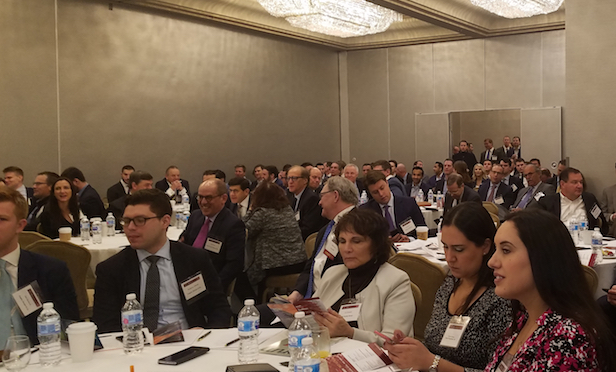
NEW YORK CITY—At the RealShare Net Lease Conference on April 5 in New York City, top professionals in the net lease development world openly shared what they look for when taking on projects. Panelist Mark Maughan, director of net lease investments at Sundance Bay, headquartered in Salt Lake City, UT, said his firm works with many developers and they must have a niche, for example, that's geographic or tenant-based.
“Some developers are known in a specific region and tenants come to them. Some groups are really good at getting their preferred developer relationship with Dollar General or CVS and they'll chase a specific tenant all over the country,” said Maughan. Developers can excel at doing value add, buying existing buildings and bringing in tenants. Sundance Bay looks at whether the tenants have a niche, a track record and a balance sheet.

The moderator of the “Increasing the Inventory: 2018 Sector Developments” panel Matt Bear founded Bear Real Estate Advisors, headquartered in Las Vegas, NV. When he said, “The best real estate is covered up with bad buildings,” the audience chuckled. Bear said the first 10 years of his career were in Las Vegas when the population literally doubled. “It was a market where you 'Build it and they will come.'” He then asked, what are developers doing to increase their deals?
Panelist Ben Hidalgo, principal of Net Lease Development, based in Fort Worth, TX, focuses on franchises and single corporate tenants. He works with many national QSRs (quick service restaurants) including Arby's, Starbucks, Steak 'n Shake, Taco Bell, to name only a few. Today's challenge is finding good sites, according to Hidalgo.
“I think the pricing for retail land has doubled in the last three years and so the price makes it challenging to get tenants to pay because the rents have gotten really inflated,” said Hidalgo. “If you deal with franchisees it's easier to get a deal quicker.”
Maughan said the tenant drives the business because unless you have a signed lease, the investor does not have a deal. The tenant also drives the timing of many deals. Landowners often want to sell their land in 90 days. But for the developer to close, they need to have a signed lease in hand.

“We're starting to see more aggressive tenants that can actually meet these deadlines to get a deal done in the due diligence period which may be 90 days,” said Maughan. “So we look for a lot of QSR tenants that are franchisees of Taco Bell, Popeyes or whoever.”
Maughan also noted in that last two months a marked increase in the sales of medical net lease buildings. “It's obvious. It's the new retail. We've done a lot more medical last year like the Fresenius Medical office building. Our next deal will be an urban care facility in Texas. It's definitely getting more attractive in this space, the 'retailization of medical,'” said Maughan.
Developers who do really well, don't take no for an answer observed Hidalgo. “The tenants are telling you they can't pay that much. Your general contractor is telling you the cost is this much. There are so many things that you have to know about and keep pushing and pushing to make it all come together,” said Hidalgo. “There are a bunch of circles. You've got your lender, your equity partner, your construction, your tenant and you've got to get all of those circles to touch.”
Rob Barse, director of development at McShane Development, based in Edina, MN, said being a developer takes vision and creativity to see something, a property that others don't or haven't seen. “You need to see around corners, whether it's predicting shifts in the local market, problems with your contractors, the engineers, your soils, and focus in on calculated risks, the due diligence process, handling a multidisciplinary process that can be pretty chaotic at times,” said Barse. “It's a fun business to be in but you've got to separate yourself with grit and creativity.”
© Touchpoint Markets, All Rights Reserved. Request academic re-use from www.copyright.com. All other uses, submit a request to [email protected]. For more inforrmation visit Asset & Logo Licensing.







